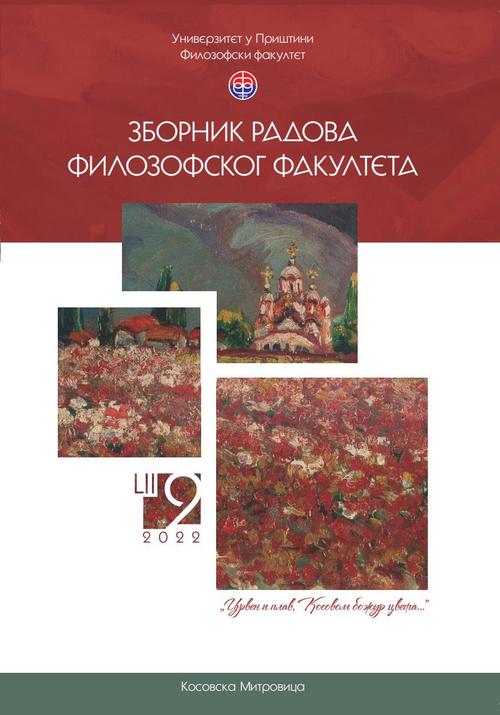Characteristics and Problems of Professional Development of Teachers in the Balkan Countries
Abstract
It is generally accepted that the quality of teaching significantly contributes to the quality of the entire educational process. One of the key factors in the quality of teaching is the teacher, whose characteristics, roles, teaching style, and also professional development are always the subject of research, not only in pedagogy but also in other social and humanistic sciences. This paper presents the characteristics and problems of the professional development of teachers in several Balkan countries. The comparative-critical analysis was performed on the programs of professional development of teachers in our country and the programs in Montenegro, Northern Macedonia, BiH, Croatia, Bulgaria, Greece, and Albania. The aim of the analysis was to determine the characteristics of the mentioned programs, their similarities and differences, as well as possible problems in their organization and implementation, which would help improve the professional development of teachers in our country.
The comparative analysis determined that the professional development of teachers in the Balkan countries is prescribed by appropriate laws and regulations. Numerous opportunities for professional development of teachers were identified in various educational programs, which led to conclusion that the mentioned programs follow the reform processes in the field of education. Considering that the professional development of teachers is directed towards the future development of society, it is necessary to mention the need for continuous empirical research in this area, the results of which would be helpful in a more complete understanding of the problems in educational practice.
References
Вучинић, Д. (2018). Улога наставника и успех ученика у настави математике (необјављена докторска дисертација). Филозофски факултет, Београд.
Вучинић, Д. и Антонијевић, Р. (2020). Улога наставника у остваривању квалитетног образовног процеса. Теме, 3, 723–744.
Грандић, Р. и Стипић, М. (2011). Професионални развој наставника – пут до квалитетног образовања. Педагошка стварност, 3–4 (57), 198–209.
Ђурић, И. (2017). Образовање и усавршавање наставника средњих стручних школа. Косовска Митровица: Филозофски факултет.
Марушић, М. (2013). Системи образовања наставника и модели њиховог професионалног развоја – компаративна анализа Србије и Грчке (одбрањена докторска дисертација). Филозофски факултет, Београд.
Николова, Н. (2019). В подкрепа на професионалното обучение за развиването на компетенции на учителите по STEМ учителите в България. Преузето са: https://www.learning-in-teaching.eu/docs/EN/IO3/Bulgaria_final_BG.pdf>
Попић, Б. (2019). Унапређење система континуираног професионалног развоја наставника у Босни и Херцеговини. У: J. Добрацик (ур.), Промјењива природа образовања наставника – пракса и потребе у Босни и Херцеговини (149–192). Сарајево: Мисија ОСЦЕ-а у Босни и Херцеговини.
Поповић, Д., Суботић, Љ., Бешовић Ивановић, А. (2017). Професионални развој на нивоу школе/вртића – приручник за наставнике у школама, предшколским установама и домовима ученика. Подгорица: Завод за школство.
Стаматовић, Ј. (2006). Стручно усавршавање као сегмент професионалног развоја наставника – процес и потребе. Настава и васпитање, 4, 473–482.
Сузић, Н. (2008). Модел доживотног усавршавања и напредовања наставника. У: С. Маринковић (ур.), Образовање и усавршавање наставника – облици и модели (43–58). Ужице: Учитељски факултет.
Аbadžija, M. (2015). Inicijalno obrazovanje predmetnih nastavnika u BiH. Sarajevo: Centar za politike i upravljanje. Preuzeto sa: http://www.cpu.org.ba/media/30657/Inicijalne-kompetencije-nastavnika.pdf>
Alimehmeti, M. & Danglli, L. (2013). Criteria Related to Processes of Teachers’ Successful Professional Development and Qualification Improvement. Problems of Education in the 21st Century, 51, 7–17.
Beara, M. & Petrović, D. (2020). Study on Teacher Education and Training (Continuous Professiona Development) Needs Analysis Systems in South Eastern Europe. Belgrade: Education Reform Initiative of South Eastern Europe.
Branković, N. (2016). Continuing Professional Development for Vocational Teachers and Trainers in Bosnia and Herzegovina. European Training Foundation.
Vlahović Štetić, V. i Vizek Vidović, V. (2005). Obrazovanje učitelja i nastavnika u Hrvatskoj. U: V. Vizek Vidović (ur.), Cjeloživotno obrazovanje učitelja i nastavnika: višestruke perspektive (101–115). Zagreb: Institut za društvena istraživanja u Zagrebu.
Gyoreva, R. (2019). The Qualification of Teachers in Bulgaria – Necessity or Obligation. Proceedings IFTE-2019, 251–262.
Mickovska, G., Kondik Mitkovska, V., Georgieva, L., Stamboliev, A., Reci, B. (2013). Policy and Practice Analysis of the Teacher Professional and Career Development in the Republic of Macedonia. Skopje: USAID. Retrieved from: http://www.mcgo.org.mk/wp-content/uploads/2013/12/Policy-and-Practice-Analysis-of-the-TeacherProfessional-and-Career-Development.pdf (4. 4. 2021).
NAVET (2016). Vocational Education and Training in Europe – Bulgaria. Cedefop ReferNet VET in Europe Reports 2016. Retrieved from: http://libserver.cedefop.europa.eu/vetelib/.pdf (4. 4. 2021).
Nikolić-Vučinić, A., Mrvaljević, I., Nikolić, O., Tomić, V., Bulatović, V., Durković, N., Vujović, A., Paljević-Šturm, D., Backović, S., Vučinić, I., Šćekić, D. (2019). Rezultati studije PISA 2015. i preporuke za obrazovne politike. Podgorica: Predstavništvo UNICEF-a u Crnoj Gori – Ministarstvo prosvjete Crne Gore.
OECD (2014). Education at a Glance 2014: OECD Indicators. Paris: OECD Publishing.
OECD (2019). Review of Evaluation and Assessment in Education in North Macedonia: Assessment and Recommendation. Skopje: UNICEF.
Petrovska, S., Sivevska, D., Runceva, J. (2018). Establishment and Functionality of the System of Professional Development of Teachers in Republic of Macedonia. KNOWLEDGE – International Journal, 2 (26), 421–426.
Reid, E. & Horváthová, B. (2016). Teacher Training Programs for Gifted Education with Focus on Sustainability. Journal of Teacher Education for Sustainability, 18 (2), 66–74.
Strategija razvoja stručnog obrazovanja u Crnoj Gori (2020–2024). Podgorica, 2019.
Terzis, N. & Moutsios, S. (2000). The Greek Educational System. In: N. Terzis (Еd.), Educational Systems of Balkan Countries: Issues and Trends (99–132). Thessaloniki: Balkan Society for Pedagogy and Еducation.
Zrno, J. (2012). Obrazovanje strukovnih nastavnika u Hrvatskoj i europskim zemljama. Andragoški glasnik, 1 (16), 43–54.
The details about the publication policy, including copyright and licensing, are available at:

